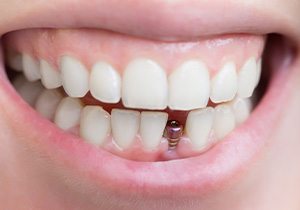Dental Implants – Mobile, AL
A Lifelike Replacement for Missing Teeth

Losing even one tooth is a devastating blow for health, oral function, and your beautiful smile – but thankfully, it doesn’t have to stay that way. Dental implants are a revolutionary solution that offers patients exceptional strength and seamlessness, especially when compared to more traditional treatment options like dentures and bridges. Our team at Parker Dental & Orthodontics takes you through the entire procedure under one roof. If you have any questions or are interested in an implant consultation, contact us today! We have multiple separate office locations to choose from, with two in Mobile, AL, serving West Mobile and University patients, as well as one in Hurley, MS and the other in Vancleave, MS.
Why Choose Parker Dental & Orthodontics for Dental Implants?
- In-House Dental Implant Placement
- Affordable In-Office Membership Plan
- Comprehensive Dentistry for the Whole Family
What are Dental Implants?

Dental implants themselves are small titanium posts that are surgically inserted into the jawbone beneath the gumline. They’re designed to replace the missing root structure of one or more teeth, providing a truly comprehensive restorative approach. Because the implants are biocompatible, they’re able to fuse with the bone to provide it with important stimulation and blood flow as well as anchor a free-standing restoration firmly in place.
The 4-Step Dental Implant Process

Dental implants are the best tooth replacement option out there. They offer so many additional benefits, like additional stability, longevity, and comfort. To achieve this, they require a unique multi-step process that takes place over the course of several months. Each person’s treatment looks a little bit different, but here are the four main steps that everyone can expect.
Initial Dental Implant Consultation

The first part of the dental implant process is your initial consultation. At this point, your dentist will examine your smile and discuss your history with you to determine if you are a good candidate. Some patients need preliminary procedures, like bone grafting and gum disease treatment, before they are able to get dental implants. If any of these apply to you, we will help you get them scheduled. Once your gums and jawbone are in good shape, we can move forward with the rest of the process.
Dental Implant Surgery

At Parker Dental & Orthodontics, we are proud to complete the entire dental implant process in house, including the surgical procedure, so you don’t need to worry about working with a specialist at a separate location. After numbing the area with a local anesthetic, an incision is made in your gum tissue. Then, the dental implant is placed into the jawbone at a precise, strategic location for optimal support. Lastly, the gums are closed, and a protective cap is placed over the end of the implant to keep it safe as the area heals.
Dental Implant Osseointegration & Abutment

Next is the recovery period. Over the next three to six months, the osseointegration process takes place. This is when the titanium implant fuses to the jawbone, essentially making it one with your jaw. Once this is complete, we will attach a metal connector piece known as an abutment to the end of the implant. Impressions are taken and sent to the dental lab so your final restoration can be created.
Delivery of Dental Implant Restoration

When your restoration is complete, you can return to our practice to have it secured to your implant via the abutment. If everything looks and feels great, you will be sent on your way to show off your complete smile!
Benefits of Dental Implants

Although dental implants have a higher up-front price tag, they offer a variety of life-changing benefits that make them a top choice among our patients looking to restore and rejuvenate their smiles. They’ll impact your everyday routine, your oral health, and continue to have positive effects on your smile for years to come. Click the button below to learn more about some of the advantages you can enjoy from choosing this state-of-the-art treatment!
Day-to-Day Benefits

The very first thing you’re likely to notice with your new dental implants is enhanced eating and speaking. Since they’re rooted down to your jawbone, they’re incredibly stable, and won’t shift as you chew or move your mouth to talk. You’ll be able to communicate with ease, and eat pretty much anything you want!
You might also feel a huge boost to your confidence. Thanks to the high quality of dental implant materials, they look just like natural teeth. You won’t have to worry about onlookers noticing gaps or flaws in your smile.
Maintaining that beautiful grin is easy with dental implants, too! You can simply brush and floss them like you would natural teeth – twice per day for brushing and at least once per day for flossing.
Health Benefits

Dental implants will improve your oral health in many ways. For one thing, replacing a missing tooth with any sort of dental restoration will prevent any remaining pearly whites from shifting and crowding together.
For another, the root-to-crown design of dental implants will help preserve your facial structure and jawbone. Normally, tooth loss can cause the skin around your lips and cheeks to appear sunken. Your jawbone, meanwhile, would start to deteriorate due to lack of stimulation. With dental implants providing both stimulation and support, you’ll maintain a healthier oral structure.
Long-Term Benefits

Looking into the future, you can expect to enjoy the benefits of your dental implants for 30 years or more if you take good care of them! This makes them the longest-lasting dental replacement option by far. Compared to the alternatives, you’ll spend less time and money on coming to our office for repairs and replacements. When you look at it that way, dental implants are a cost-effective long-term investment.
Who Can Dental Implants Help?

Dental implants are able to help a wide range of patients, regardless of what type of tooth loss they’re experiencing. Whether you’re affected by multiple gaps within your smile or need to replace an entire arch, implants are able to provide an unwavering support system that makes replacement teeth feel more lifelike and functional.
Missing One Tooth
For a single missing tooth, we will likely replace it by securing one dental implant below the gumline and into the jawbone. After it has fused with the bone, we can attach a free-standing dental crown to it to fill the gap in the arch.
Missing Multiple Teeth
Instead of having to use your natural teeth to anchor a traditional bridge, we can secure the prosthetic to two dental implants placed at either side of the gap in your arch. We often use this method for patients missing anywhere between one and four consecutive teeth.
Missing All Teeth
For an entire arch of missing teeth, we can anchor a full denture to anywhere from one to eight dental implants secured along your arch. These will keep the prosthetic from slipping or shifting within the mouth, making eating and speaking much easier, as well as eliminating the need for denture adhesive.
Understanding the Cost of Dental Implants

As you consider dental implants, you’ll naturally want to look into their price. The posts won’t do you much good if they greatly exceed your budget. That said, the cost of dental implants varies by patient; you’ll need to consult our team for a precise estimate. We can find ways to make your care affordable once you do, outlining factors like dental insurance, payment options, etc. For more specific details, please keep reading or call us soon.
Preliminary Treatments & Dental Implant Surgery

You may need preliminary care before you get dental implants. If so, your “extra” procedures - which could range from tooth extraction to gum disease therapy – will add to your final treatment cost. Don’t panic over this scenario, though; such services would help your restorations succeed and aren’t wasteful. Most dental plans also cover preliminary procedures.
Of course, dental implant surgery also incurs its own cost. The placement’s price will also rise or fall depending on implant location, sedation, and similar factors. Just know that your final treatment results will be excellent regardless; we ensure that much by performing the entire surgery in-house.
The Parts of Your Dental Implant

You should also note that a dental implant's parts affect its treatment cost. In particular, the most notable of these include:
- Implant Number – Dental implant treatment costs more as it involves more posts.
- Final Restoration Type – In truth, dentures, dental bridges, and dental crowns have distinct costs. That means the final restoration you get will impact your care’s price.
- Implant Size/Material – Long implants usually cost more than short ones, and zirconia posts are pricier than titanium.
- Implant Brand – Various manufacturers make dental implants differently, so your post’s brand will also affect its cost.
How Dental Implants Can Save You Money

Dental implants are great long-term investments, even with their high upfront price. Getting a few would save you plenty of money over time.
The reason comes down to implants’ long lifespans. Since these posts can potentially work for a lifetime, they rarely need many repairs or replacements. Dental implants should thus save you money otherwise spent on dentures or dental bridge maintenance.
Does My Dental Insurance Cover Dental Implants?

Thankfully enough, dental insurance generally covers dental implants. Most plans will even meet ten to fifty percent of the posts’ price, greatly reducing the amount you must pay. As such, you can often trust your plan to provide discounted care.
On the other hand, exceptions to these rules also exist. You should thus confirm your plan’s details before you commit to treatment. If you’d like, our team can help you do so.
Making Dental Implants Affordable

Even without insurance, it’s possible to make dental implants more affordable. Just rely on our practice’s helpful payment options, including ones like:
- Dental Membership Plans – By paying a monthly or annual fee, you can get a 10% discount on (among other things) dental implants from our office.
- Flexible Financing – We offer flexible payment plans through CareCredit, a reputable 3rd party financier. They’d let you pay for dental implants in affordable installments.
Instead of “breaking the bank,” visit our office to get affordable dental implants. We’ll make sure your restored smile fits your budget!
Maintaining & Caring for Your Dental Implants

It’s up to you to take care of your dental implants after receiving them—but rest assured, our team is here to guide you through every step of this process and provide you with the information you need to make well-informed choices. If you take a proactive approach and keep close tabs on your oral health, you can expect your implants to serve you well for decades or even a lifetime! With that in mind, here’s what you need to know about caring for your dental implants and setting them up for lasting success.
Make Oral Hygiene a Priority

Although your dental implants replace your missing teeth, that doesn’t mean you can get away with not taking proper care of them! You should brush and floss your new smile every single day, no exceptions, since issues like gum disease can still pose a threat, and if you still have any natural teeth remaining, they’re at risk of decay. Fortunately, caring for dental implants is just as easy as caring for your natural pearly whites, and they require no special maintenance or specific cleaners.
Eat a Healthy Diet

There are numerous reasons to stick to a healthy diet, but when it comes to dental implants, sticking to a nutritious, vitamin-rich diet can go quite a long way. Foods that include calcium and vitamin C are very beneficial since they directly benefit your jawbone’s health. You can also swap out sugary and starchy sweets and snacks for things like fruits, vegetables, leafy greens, and dairy products; these all help your gum health, which in turn supports your implants.
Break Bad Habits

There are several habits out there that can harm your dental implants if you aren’t careful. One of the biggest offenders is smoking or using tobacco products, but beyond that, you shouldn’t bite into hard objects frequently or use your teeth as tools. Even innocent habits like biting your nails or using your teeth to open packaging can cause harm to your implants.
Protect Your Dental Implants

If you play contact sports regularly, you probably already know that dental injuries happen quite frequently both on and off the field. However, you may not know that dental implants need to be protected just like natural teeth do—which is why wearing a mouthguard is so important. Similarly, if you grind or clench your teeth at night, a condition known as bruxism, you should inquire about a nightguard. These devices can prevent wear on your implant restorations while also ensuring your jaw isn’t hurt by excessive strain and pressure.
Schedule Regular Dental Checkups

By coming to see us twice a year, our team can inspect your smile and make sure that no issues are lurking beneath the radar that might harm your dental implants. This is one of the most important habits to keep up with following your implant placement! We will also perform a cleaning during these visits to ensure your dental implant restorations remain as clean as they are free of any issues.
Dental Implant FAQs
What are dental implants made of?
Dental implants are made from titanium. Not only is it strong and durable, but it’s also less likely to corrode and is lightweight. This allows it to reduce the force placed on your jawbone while restoring the strength of your bite. In addition, it’s an incredibly biocompatible metal that is able to form something called an oxide layer when it’s surgically placed under your gums. This allows them to last for decades without breaking down or failing. Another great benefit of titanium is that it has the ability to fuse with your jawbone. This allows for a strong foundation for your replacement teeth, while also stimulating blood flow and preventing deterioration and bone loss.
How long do dental implants last?
With the proper maintenance and care, dental implants have been proven to last over 35 years. Because they’re a relatively new advancement in dentistry, there haven’t been too many long-term studies conducted on their lifespan. This means that they could last even longer.
To make sure your oral health is in good shape and your gums can support your implants, all you’ll need to do is brush twice each day with fluoride toothpaste, floss daily, and regularly rinse with an antibacterial mouthwash. You’ll also want to visit your dentist every six months for checkups and cleanings.
Can dental implants fail?
Dental implants utilize the latest technology that dentistry has to offer. This allows the procedure to be precise, and is the reason that implants boast an impressive 95 percent success rate. However, there are several factors that can cause implants to fail. Some of these include:
- Poor oral hygiene
- Infection
- Smoking and tobacco use
- Uncontrolled diabetes
- Autoimmune diseases
If you’re concerned about implants failure, don’t hesitate to speak with your dentist. They can put your worries to rest and alert you of any possible risks.

